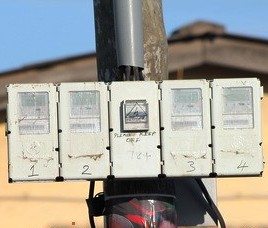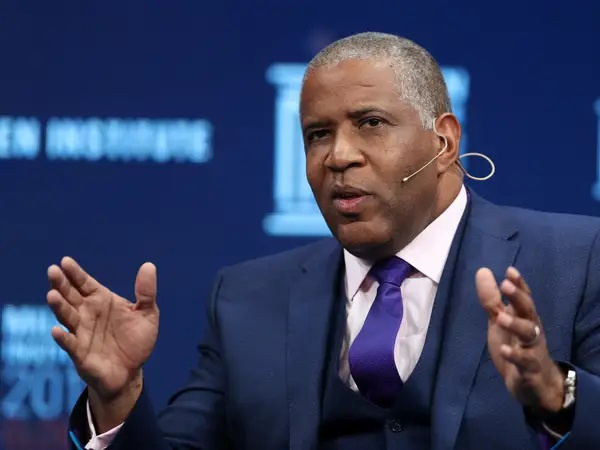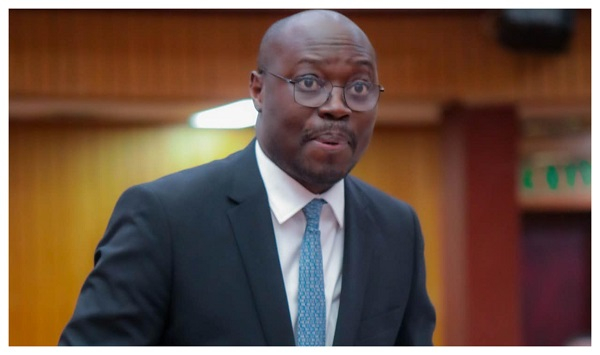Here is all you need to know about the BoG’s ‘Ghana Gold Coin’
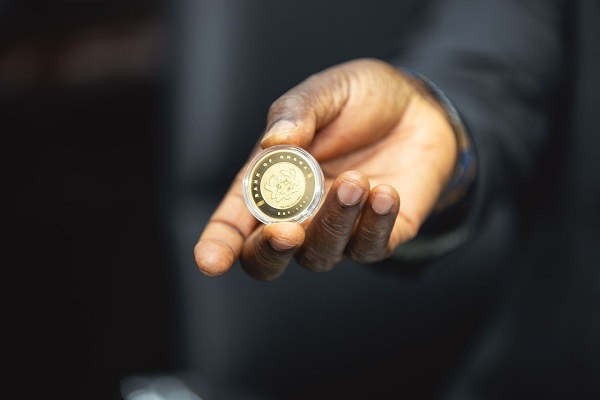
The Bank of Ghana (BoG) announced its new investment initiative, the Ghana Gold Coin at the just ended Monetary Policy Meeting on September 27, 2024, to discourage people from hoarding dollars.
According to the Governor of the Bank of Ghana, Dr. Ernest Addison, this initiative seeks to absorb excess liquidity in the market and strengthen the local currency against major trading currencies.
The coin will be available in three denominations: a one-ounce coin, a half-ounce coin, and a quarter-ounce coin, and will be sold in commercial banks within two weeks.
“The Ghana Gold Coin is manufactured from dowry gold dug out of Ghana which has been refined to 99.99 per cent purity. It is issued and guaranteed by the BoG.
“It will be available in three different units. That is the one-ounce coin, the half-ounce coin and the quarter-ounce coin to suit different investment dates. Each coin has the Ghana quote of arms in front and the independence arch at the back,” the Governor said.
He also added that “The packing of the gold coin will be a wooden story box, a transparent coin holder and a certificate of ownership. The Ghana Gold enables the BoG to mop up extra liquidity from the banking sector and will supplement the use of our BoG bills… It gives savers residence in Ghana, an additional avenue to invest, and reap the benefits of the BoG domestic gold purchase programme.”
However, the Central Bank has answered some Frequently Asked Questions about the Gold Coin
1. What is a Gold Coin?
Response: A gold coin is a coin manufactured primarily from refined gold.
2. What are the types of Gold Coins?
Response: There are different types of gold coins in the market, but they all fall into two basic categories.
2.1. Bullion Coins: Bullion coins are made from refined gold. In most cases,
they are manufactured and guaranteed by the government or a government entity.
The most popular types of bullion coins include:
• American Gold Buffalo
• South African Gold Krugerrand
• Australian Kangaroo
• Austrian Philharmonic
• Canadian Maple Leaf
• American Gold Eagle
2.2 Numismatic Coins: Numismatic coins are collector’s items and of higher value than bullion coins. The value of numismatic coins is based on the amount of gold they contain, their rarity and condition.
3. What is the Ghana Gold Coin (GGC)?
Response: The GGC is a coin manufactured from responsibly mined gold from
Ghana that has been refined to 99.99% purity. The coin is issued and guaranteed
by the Bank of Ghana (BOG) and is available in 1 oz Coin, 1/2 oz Coin and 1/4
oz Coin to suit different investment needs. Each coin has the Ghana Coat of Arms
in front and the Independence Arch at the back. The packaging includes the gold
coin, a wooden storage box, a transparent coin holder and a certificate of
ownership.
4. How does the BOG ensure that the GGC is not from illegally mined gold?
Gold used for the manufacture of the GGC is from traceable, responsibly mined
sources in Ghana in line with the BOG’s Responsible Gold Sourcing Framework.
5. Why is the BOG introducing the GGC?
Response: The GGC gives savers resident in Ghana an additional avenue to
invest and reap the benefits from the BOG’s domestic gold purchase program.
Gold can serve as a natural hedge during periods of economic turbulence. The
issuance of the GGC broadens access to this enduring financial asset, enabling
investors to diversify their financial portfolios.
6. What are the different sizes and weights of the GGC?
Response: The GGC is available in different weights to suit different investment needs. They are:
• 1 oz Coin: Contains one ounce of pure gold and it is 34mm in dimension.
• 1/2 oz Coin: Contains half ounce of gold of pure gold and it is 27mm in
dimension.
• 1/4 oz Coin: Contains a quarter ounce of pure gold and it is 22mm in
dimension.
7. What is the purity level of the GGC?
Response: Each coin is manufactured from 99.99% of responsibly mined and
refined gold, which gives the coin the original gold colour.
8. What are the unique features of the GGC?
Response: The GGC has the Ghana Coat of Arms in front and the Independence Arch at the back.
See the features of the coin below
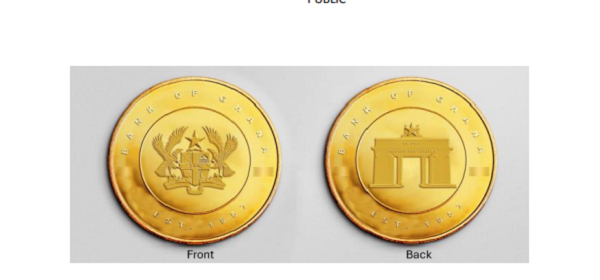
9. How does the packaging of the GGC look like?
Response: The packing includes the gold coin, wooden storage box,
transparent coin holder, and a certificate of ownership.
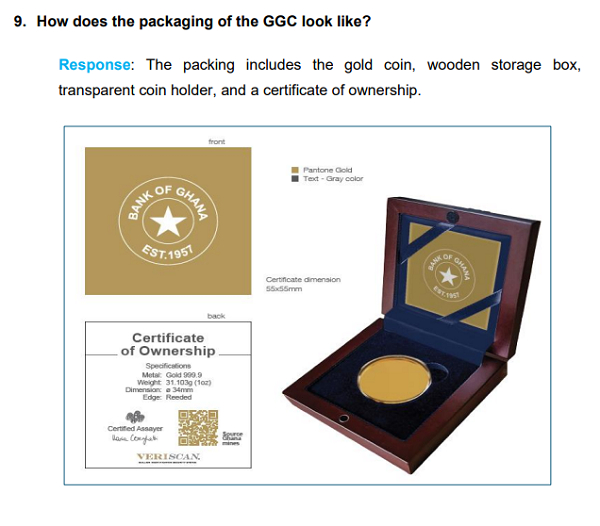
The applicable transaction exchange rate for pricing of GGC shall be the United
States Dollar against the Ghana Cedi rate quoted using the previous day’s close
Bloomberg REGN Mid-Rate.
11. Where can I find the price of the GGC daily?
Response: The price of the GGC shall be published on the BOG website daily by 9:00am GMT using the previous day’s close of LBMA Auction PM Price and
Bloomberg REGN Mid-Rate USDGHS exchange rate.
12.Can I buy GGC using Ghana Cedis?
Response: Yes. The currency for transactions shall be in Ghana Cedis for
resident buyers based on the prevailing cedi-dollar exchange rate.
13.Where can I buy or sell the GGC?
Response: Commercial banks will be the main channel for the buying and selling of the GGC to the public. Commercial banks can buy GGC on behalf of their customers and as part of the process they shall be required to open a gold
account with BOG to facilitate this transaction. The BOG will not sell to or buy
gold coins directly from the public. For more information, please contact the
nearest branch of your commercial bank.
14.Can commercial banks safely keep my GGC?
Response: Buyers may keep the physical gold coin or deposit it with their
commercial banks for safekeeping at a marginal fee.
15.Is there any fee associated with buying or selling the GGC?
Response: Yes, Commercial banks may charge customers a transaction fee
for the resale of the GGC. A uniform fee will be charged to cover associated
value-added costs of the gold coin, and the wooden storage box incurred by
the BOG.
16.Can I purchase GGC using cash?
Response: No, customers can only pay through their Bank or mobile money
accounts.
17.Can the GGC be used as legal tender?
Response: No. The GGC, unlike notes and coins in circulation, is not legal tender. However, it is a financial asset.
18.Can I also buy and sell GGC outside Ghana?
Response: No. BOG is working on distribution platforms for trading of GGC
outside of Ghana.
19.What is the procedure to buy the gold coins?
Response: You must place a gold coin order at your bank, specifying the
desired weight of coin and the quantity you need. You are expected to have
enough Ghana Cedis in your bank account to cover the purchase.
Your bank will then place a buy order at the BOG same day to purchase the
GGC on your behalf.
20. What is the procedure to sell your gold coins to a bank?
Response:
• Check the current price of the gold coin on the BOG website or any other
authorised platform and place a sale order to your bank stating the quantity of
coins you want to sell.
• Get your coins authenticated for settlement at the bank or any institution
authorised by BOG.
• The BOG guarantees GCC so if the banks are not able to buy back, the BOG
stands ready to buy back. Some discounts may apply.
21.Is there any limit to how many gold coins an individual can purchase?
Response: No. There are no limits on your purchase. You can hold as many
gold coins as you can afford.
22. How can you verify the authenticity of the GGC?
Response: Verification of the authenticity of the GGC is as follows:
• Weight and size: The GGC has specific dimensions and weights. Weighing
and measuring the coin can provide a quick indication of its authenticity.
• Appearance and Design: Examine the design details of the coin. The GGC
shows the Ghana Coat of Arms on one side and the Independence Arch on the
other side. Any fuzziness or deviation in the design could indicate a counterfeit.
• Magnet test: Gold is not magnetic. If the coin is attracted to a magnet, it is not made of pure gold and is probably a counterfeit.
• Use the Veriscan Technology Application: The GGC has Veriscan technology which can be downloaded from the Apple store to check the authenticity of the gold coin.
Please follow the steps below:
a. Download the VERISCAN – Bullion Security app. This app is for the time being only available on iPhone, we are still developing the Android version of the app.
b. Once you have created an account, choose Manual Selection.
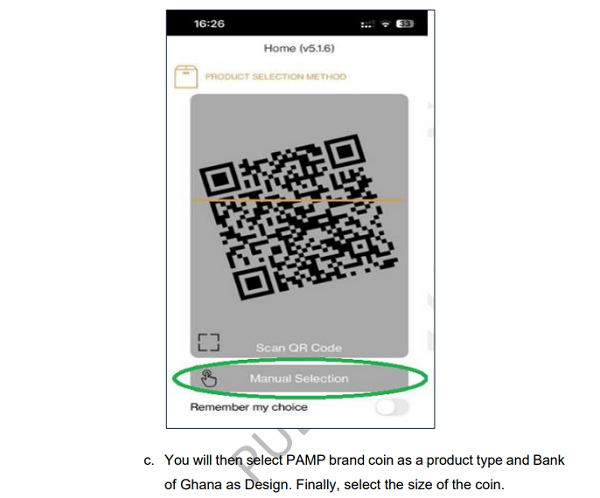
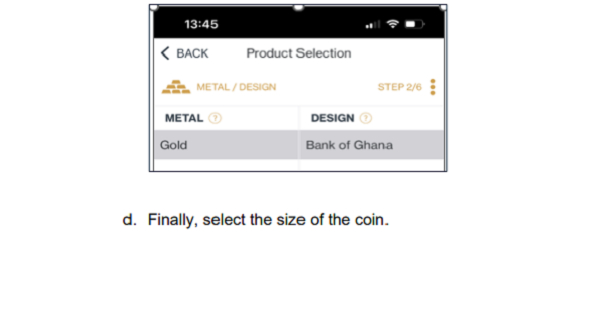
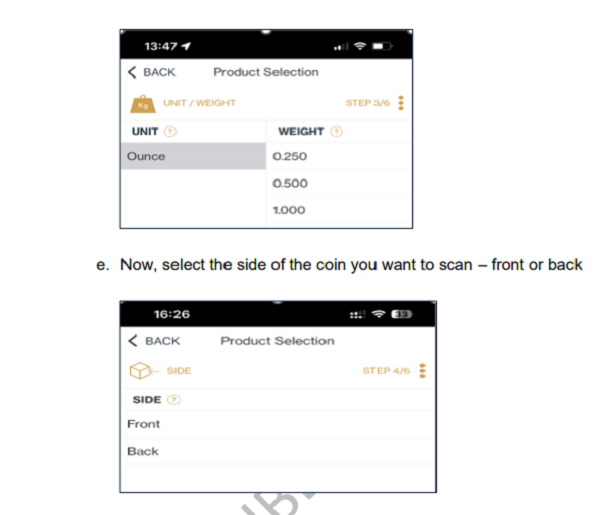
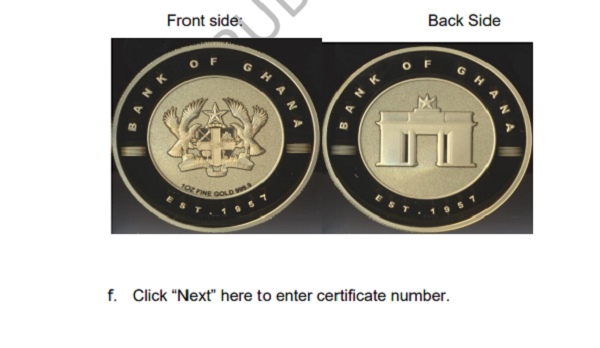
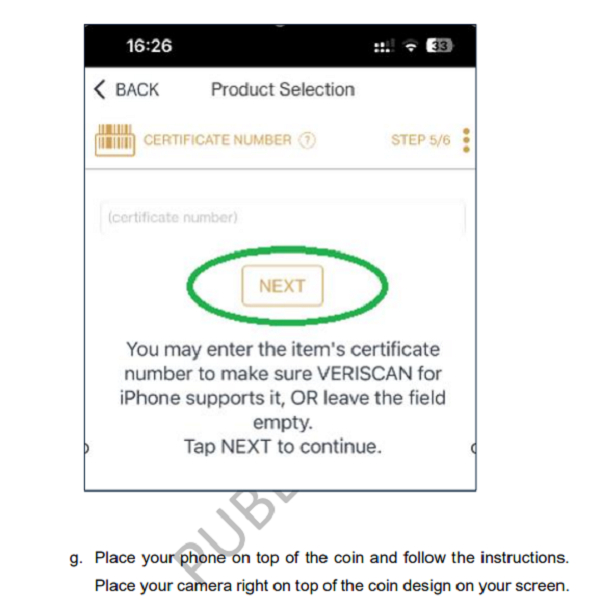
23.How will the BOG ensure that the issuance of gold coins does not promote
money laundering?
Response: The BOG has implemented stringent Anti-Money Laundering/ Countering the Financing of Terrorism (AML/ CFT) measures to ensure that the issuance of gold coins complies with national and international regulations.
All transactions shall be routed through banks where customers have been subjected to thorough Know Your Customer and Customer Due Diligence checks and sources of funds are proven. In addition, transaction monitoring and reporting of suspicious activities frameworks shall be in place.
All buyers will be required to undergo identity verification, and transactions will be subject to limits that trigger additional scrutiny if exceeded. These measures are designed to prevent the use of gold coins in illicit activities.
24.What steps are in place to prevent the gold coins from being used to finance terrorism?
Response: Purchases are screened against national and international sanctions lists. This also includes the verification of the source of funds for all purchases and monitoring of all high-risk transactions.
25.How will the BOG monitor large transactions involving the GGC to prevent
illicit activities?
Response: The BOG will ensure that GGC transactions are conducted
transparently and in compliance with AML/CFT regulations.
26.How will BOG ensure that the GGC is not used to circumvent existing
financial regulations?
Response: Mandatory identity verification, transaction reporting, and strict compliance will be required as part of the BOG’s AML/CFT framework on the
banking sector to ensure that the GGC is not used to circumvent existing financial regulations.
27.What measures are in place to ensure that the proceeds from the sale of GGC
are not linked to criminal activities?
Response: Commercial banks and authorised institutions involved in the sale and purchase of the GGC are required to implement robust AML/CFT checks,
including monitoring for any red flags that could indicate suspicious activity.
Source: www.ghanaweb.com


